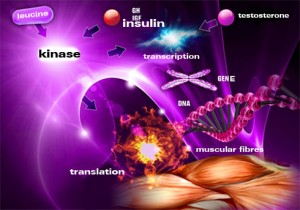 I had two thoughts about the intro for this article. A typical layout would give a brief background, what the study in question is about, and then some anecdote from my good self, or a complete tangent that is neither useful nor particularly interesting (this is where you guys jump in and tell me how interesting I actually am and how much you enjoy reading my words). However today I really don’t see the need to insult your intelligence by explaining what leucine is. What I will say, however, is that leucine is one of the three branch-chain amino acids (BCAA) which are interesting as they are typically metabolized directly by muscle, rather than in the liver like other amino acids. I say this because everyone knows that BCAA are anti-catabolic, however it’s never been abundantly clear why. And a lot of people have always assumed that they were simply because they spare existing BCAA supplies already in the muscle. Yeah, it’s simplistic, but I guess it’s always made sense. New research coming out of Brazil has given us a more scientific explanation of why leucine is anti-catabolic: Ubiquitin inhibition.
I had two thoughts about the intro for this article. A typical layout would give a brief background, what the study in question is about, and then some anecdote from my good self, or a complete tangent that is neither useful nor particularly interesting (this is where you guys jump in and tell me how interesting I actually am and how much you enjoy reading my words). However today I really don’t see the need to insult your intelligence by explaining what leucine is. What I will say, however, is that leucine is one of the three branch-chain amino acids (BCAA) which are interesting as they are typically metabolized directly by muscle, rather than in the liver like other amino acids. I say this because everyone knows that BCAA are anti-catabolic, however it’s never been abundantly clear why. And a lot of people have always assumed that they were simply because they spare existing BCAA supplies already in the muscle. Yeah, it’s simplistic, but I guess it’s always made sense. New research coming out of Brazil has given us a more scientific explanation of why leucine is anti-catabolic: Ubiquitin inhibition.
I know what you’re thinking, what the hell is ubiquitin? Well I can tell you that it’s not a brand of nicotine gum. I can also tell you that it does a ton of stuff in the body, but its fundamental role is that of a sort of garbage man. While it doesn’t degrade cells directly itself (that is the job of the proteosome), it flags which cells need to be destroyed. That’s about as simple as I can make it, and probably about as simple as it needs to be.
The study from Brazil involved looking at the difference leucine has on muscle loss during immobilization. For humans this means being bed-ridden, or suffering some sort of accident or disease that prevents movement. For the rats in the study, it means strapping them down and watching them waste away (not nice, but this is science, folks). As expected, they noted that the leucine group did not lose as much muscle, along with a smaller increase in the ubiquitin ligases seen in the placebo group. Another benefit is that the leucine preserved the bigger, stronger type II fast-twitch muscle fibers more than the smaller, type I slow-twitch ones. Awesome! So with less garbage men flagging cells for destruction, fewer cells get destroyed. This is obviously a great thing for bodybuilders aiming to preserve muscle during cutting.
The researchers are keen to point out, however, that for all it is anti-catabolic, leucine is not directly anabolic. There are more variables required to be present for leucine to take part in any anabolism, but this study is another nail for the dieting bodybuilder to hang his hat on.
Source: Baptista IL, Leal ML, Artioli GG, Aoki MS, Fiamoncini J, Turri AO, Curi R, Miyabara EH, Moriscot AS. Leucine attenuates skeletal muscle wasting via inhibition of ubiquitin ligases. Muscle Nerve. 2010 Jan 15.
